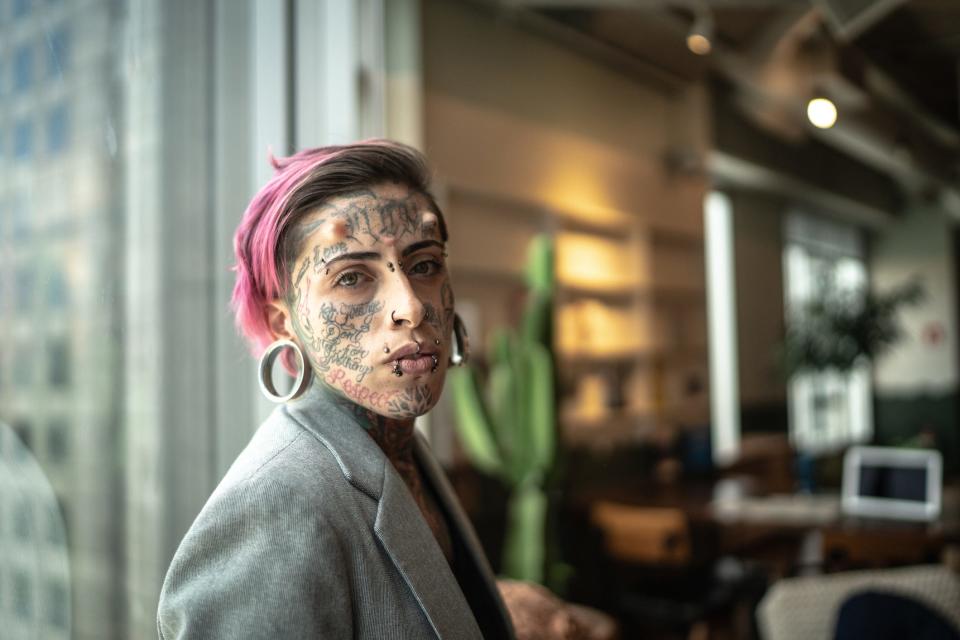A woman said her tattoos got her rejected for a job, but experts say personality is far more important
A woman said her tattoos got her rejected for a job, but experts say personality is far more important

-
A tattooed content creator sparked a debate about hiring biases after being rejected by T.J. Maxx.
-
Experts say tattoos can impact hiring decisions, especially in customer-facing roles.
-
But overall, personality and cultural fit are more important.
TikToker Ash Putnam was frustrated after T.J. Maxx denied her application — and she thinks her tattoos were to blame.
Some of her visible designs include a skull with horns on her neck, solid black patches on her arms, and a pattern on her forehead. Putnam, 23, also has multiple facial piercings, including a large silver ring hanging from her septum.
“I hate that my tattoos are such a defining factor for me getting a job or not,” she said in a recent TikTok. “Just because I have tattoos doesn’t mean I’m not going to be a good worker.”
Putnam, from California, said she went into the store to ask why she hadn’t gotten the job, and the hiring manager told her she didn’t have enough experience. The hiring manager also denied that her tattoos played any role in the rejection. T.J. Maxx did not respond to a request by Business Insider for comment.
Putnam wasn’t convinced and took to TikTok to complain. Many commentators claimed her attitude may have been to blame, rather than her tattoos. Others thought her body art likely played a role in the rejection.
While the jury is out over whether tattoos can damage your prospects of being hired, experts told BI that the personality of a prospective candidate is likely more important for recruiters.
Putnam’s story went viral
Putnam’s video amassed 7.4 million views, and it struck a nerve.
“HR supervisor here,” one person commented. “There is no way any company would put you in front of customers like T.J. Maxx.”
Another commenter, who said they used to be a hiring manager for the store, said: “I will tell you it’s the facial piercings and tattoos.”
Some fellow content also creators criticized Putnam’s approach.
Ivy Johnson, for example, who also has many tattoos, said she had worked in corporate America as a hiring manager before starting up her apothecary business.
“Your tattoos are very aggressive,” she said. With customer-facing positions, she said, “that doesn’t go over well.”
Johnson said she also thought Putnam had “a really bad attitude.”
“If you had come into my business after an interview, or even applying and chatting on the phone, even if I didn’t even know that you’re a heavily tattooed person, I’d be like, bye, there’s the door,” she said.
“You have to put your best foot forward in an interviewing circumstance, no matter what you do, what you’re applying for, or what you look like.”
It depends on the role
Almost a third (32%) of people in the US have a tattoo, and 22% have more than one, according to Pew Research Center.
Some studies have suggested that tattoos can affect someone’s career progression. In 2018, a LinkedIn survey found that 40% of respondents said they had rejected a candidate for a job because they had a visible tattoo. 88% of recruiters and HR professionals who responded said they thought tattoos limited a candidate’s prospects.
However, research from the University of Miami that same year found tattooed job-seekers were no less likely to be employed than those without.
The stigma of tattoos is lessening every day, with many employers no longer having an issue with hiring tattooed employees, according to Indeed.
There may still be a line, though, and some viewers argued that Putnam crossed it. Putnam didn’t comment on the record for this article, but View comments
Powered by WPeMatico

